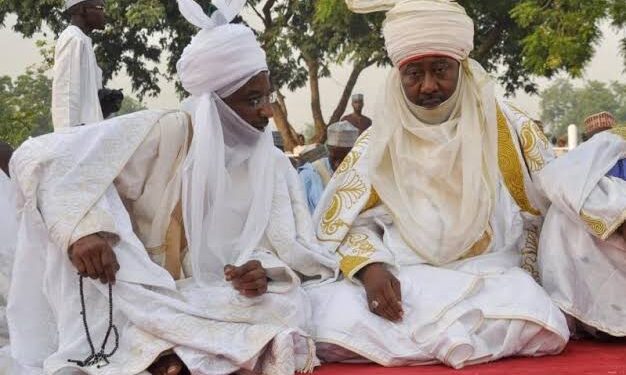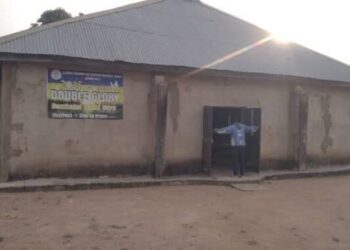By Sunday Isuwa
In the rich tapestry of Kano Emirate’s history, the dethronement and disposition of Sarkis (Emirs) have shaped the course of power and governance.
From the earliest recorded cases to the recent controversies, these instances have left an indelible mark on the socio-political landscape of Kano.
We delve into the annals of time to explore the historical accounts of dethronement in the Kano Emirate, shedding light on the circumstances surrounding each event and the lasting impact they have had on the emirate.
1. Guguwa Dan Gijimasu – The First Dethroned Sarki (1247-1290)
The annals of history reveal that Guguwa Dan Gijimasu was the first recorded Sarki to be dethroned in Kano. His reign, which spanned from 1247 to 1290, was marked by challenges and internal conflicts that ultimately led to his disposition.
2. Dakauta Dan Abdullahi Baja – A Short-Lived Reign (1452)
Dakauta Dan Abdullahi Baja’s tenure as Sarki was tragically short-lived, lasting only a single day. The circumstances surrounding his swift removal from power remain shrouded in mystery.
3. Sarki Atuma Dan Dakauta – The Seven-Day Rule (1452)
Succeeding his father, Dakauta, Sarki Atuma Dan Dakauta’s reign lasted a mere seven days in 1452. His abrupt removal from the throne further deepened the intrigue surrounding the dethronement of Kano Emirs.
4. Sarki Yakubu Dan Kisoke – A Tale of Reinstatement and Decline (1565)
Sarki Yakubu Dan Kisoke’s rule, which lasted for four months and twenty-nine days, was marred by controversy. Although initially dethroned in 1565, he was offered reinstatement. However, Yakubu Dan Kisoke declined the offer and chose to live in a place that would later be known as Yakufawa.
5. Dauda Abasama – Following in His Father’s Footsteps (1565)
Dauda Abasama, the son of Sarki Yakubu Dan Kisoke, faced a similar fate as his father. After ruling Kano for just 50 days, he was deposed and settled in the village of Kwarmashe.
6. Sarki Abubarkar Kado Dan Rumfa – The Pious Ruler (1565-1573)
Sarki Abubarkar Kado Dan Rumfa’s reign was marked by piety and devotion. However, his eight-and-a-half-year rule came to an abrupt end when he was dethroned in 1573.
7. Sarki Alhaji Dan Kutumbi – Settlement in Dan-Zaki (1648-1649)
Sarki Alhaji Dan Kutumbi’s reign was short-lived, lasting only from 1648 to 1649. After his dethronement, he settled in the village of Dan-Zaki in Gezawa.
8. Sarki Kukuna Dan Alhaji – A Roller Coaster Reign (1651-1652)
Sarki Kukuna Dan Alhaji’s rule was marked by highs and lows. Initially dethroned after a year, he was reinstated three months later. Kukuna Dan Alhaji went on to rule Kano for another eight years and seven months.
9. Sarki Soyaki Dan Shekarau – A Brief Stint (1652)
Sarki Soyaki Dan Shekarau’s reign lasted a mere three months before he was sacked in 1652. He subsequently resided in Dakurawa.
10. A Long Interlude and the British Intervention (1652-1903)
Following the dethronement in 1652, the Kano Emirate experienced a significant period of relief from removals, lasting for 250 years. However, in 1903, the British dethroned Sarkin Kano Alu, taking him to Yola and later Lokoja, where he died in the 1920s.
11. The Removal of Ag Sarki Waziri Allah (1909)
In 1909, Mr. Temple, the British residential officer in Kano, deposed Ag Sarki Waziri Allah, further highlighting the influence of colonial powers on the dethronement of Kano Emirs.
12. Sarkin Kano Sanusi I – Financial Misappropriation and Deposition (1953-1963)
Sarkin Kano Sanusi I faced a tumultuous reign that ultimately led to his deposition in 1963. Indicted for financial misappropriation by the Muffet Committee of Enquiry, Sanusi I was taken to Azare and later relocated to Wudil, where he passed away in 1991. His removal highlighted the challenges faced by Emirs in navigating the complexities of governance and accountability.
13. Sarkin Kano Muhammadu Sanusi II – A Controversial Disposition (2020)
In a more recent and highly controversial event, Sarkin Kano Muhammadu Sanusi II was deposed by Governor Abdullahi Umar Ganduje on March 9, 2020. The circumstances surrounding his removal were widely debated, with allegations of political motivations and clashes between traditional and political powers. Sanusi II was subsequently taken to Loko in Nasarawa state. He was taken to Lagos by friends, where he was living, moving around other states of Nigeria and abroad.
14. The Kano Emirate Council Law (Repeal Bill) of 2024
The Kano state house of assembly passed the Kano Emirate Council Law (repeal bill) 2024 on Thursday 23 May, 20214 which was signed by the state Governor, Abba Kabir Yusuf (Abba Gida Gida) helping for a return of Emir Sanusi to the throne.
This also is having a significant implications for the emirate. The law abrogated the establishment of five new emirates in the state, and all offices established under the repealed law were set aside. This legislative action further shaped the power dynamics within the Kano Emirate.
15. Uncertain Future: Reinstatement or Permanent Exclusion?
The dethronement of Sarkin Kano Muhammadu Sanusi II raises questions about his potential reinstatement and the course of his future.
Many thought he would follow in the footsteps of Sarki Yakubu Dan Kisoke and decline the offer of reinstatement. But he has taken steps like Sarki Kukuna Dan Alhaji, after being given a second chance to rule, he has accepted the letter of appointment from Governor Abba Kabir, despite an earlier court order restraining the action of the Governor.
The history of dethronement in the Kano Emirate is a testament to the ever-evolving dynamics of power and authority. From the earliest recorded cases to the recent controversies, each dethronement has left an indelible mark on the emirate’s history. The stories of Sarkis who faced removal and their subsequent lives in exile or settlement reflect the intricate interplay between tradition, politics, and colonial influence.
As the Kano Emirate moves forward, the legacy of dethroned Sarkis serves as a reminder of the challenges and responsibilities that come with leadership in a changing world.











